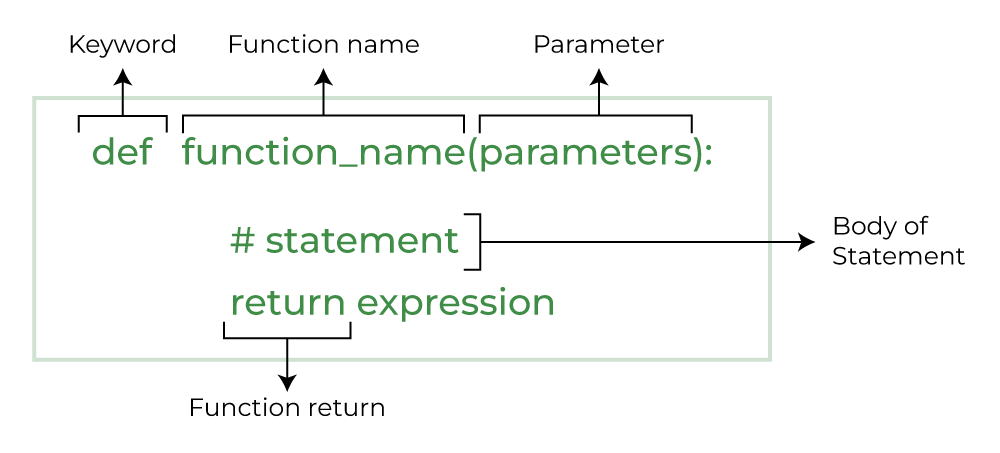Learning Python with Advent of Code Walkthroughs
Dazbo's Advent of Code solutions, written in Python
The Python Journey - Functions

Useful Links
FunctionsDocstringsExceptionsLambda FunctionsMap, Filter, Reduce
Functions
Page Contents
Overview
A function is a way of taking some code and making it callable. This allows us to implement chunks of code that we want to re-use. It also helps us break down our code into manageable and readable units of functionality.
The general syntax is:
def my_function(some_arg, some_other_arg):
""" Some docstring """
some_result = do_some_stuff(some_arg)
ret_value = do_some_other_stuff(some_other_arg, some_result)
return ret_value
- The
defkeyword binds a function body (i.e. the code) to a name, such that a function is simply an object. Thus, a function is a callable object. - After a function has been defined, we can call our function from another part of our code.
- Function arguments are passed in the brackets. Functions do not always require arguments.
- It is useful to include a docstring, i.e. brief documentation that explains what the function does, and how to use it.
- A function does not always need to return a value. But often, a function does something, and then returns a value as output. If no return value is explicitly specified, the function will always return
None. - Functions can return multiple values, as a
tuple. Whenever more than one value is returned by a function, it is automatically converted to a tuple. For example:
def min_and_max(items):
""" Takes a list of values, and returns the smallest and largest values from the list.
Returns: a tuple, composed of the min and max values from the list """
return min(items), max(items)
print(min_and_max([50,5,20,30]))
Output:
(5, 50)
Note how the output is actually just a single tuple, containing our two values.
Fibonacci Example
The Fibonacci sequence is an infinite sequence where each value is the sum of the previous two values.
1, 1, 2, 3, 5, 8, 13, 21, etc
Here I implement a function that generates the sequence with n iterations.
def fib(n):
""" Generate the Fibonacci Sequence for n iterations """
ret_val = []
if (n==0):
return ret_val
a = 0
b = 1
for iteration in range(n):
ret_val.append(f"Iteration {iteration}: value={str(b)}")
a, b = b, a+b
return ret_val
# Test our code
try:
iterations = int(input("How many Fibonacci numbers would you like? "))
values = fib(iterations)
for v in values:
print(v)
except ValueError:
print("You didn't enter a number, you muppet.")
Some points to note:
In place swapping is cool!
Instead of this:
temp = a
a = b
b = a + temp
We can write this:
a, b = b, a+b
- To handle bad input, I’m using exceptions. Check out my page on this, here.
- I’m using
range(n)in combination with aforloop so that we can iterate over the loopntimes.
Lambda Functions
A lambda function is a small anonymous function that contains only a single expression. When we say “anonymous”, we mean that the function is not explicitly defined using def. Instead, it is simply defined as an expression, at the point it is required.
A lambda function can have zero, one or many arguments. But it can only perform a single statement, and this statement must be an expression that evaluates to a result.
Clear as mud?
This will help:
# Here we define a function explicitly, using the def keyword
def add(x,y):
return x + y
# But this lambda function is equivalent.
# The accepted arguments are always placed before the colon.
# The expression that returns is written after the colon.
lambda x, y: x + y
Let’s try using a lambda function to do something useful.
Imagine we have a list of names, where each name is given in the format “firstname lastname”. We want to sort the list based on the lastname.
We can do this with a lambda:
people = [
"Bob Pleb",
"Duncan Idaho",
"Fred Planck",
"Oliver Smith",
"Russ Martin",
"Zoltan Adler"]
# sort using lambda that splits each name and returns the last name
sorted_people = sorted(people, key=lambda name: name.split()[-1])
print("\n".join(sorted_people))
Our lambda function is simply this:
lambda name: name.split()[-1]
It expects a single parameter, called name. It splits this name, and then returns the last word from the split. Hence, if name is "firstname lastname", then the result of name.split()[-1] will be "lastname".
We pass this lambda function into our sorted() function, which then applies the lambda function to every member of this list.
Thus, the output is sorted in alphabetically last name order, as required:
Zoltan Adler
Duncan Idaho
Russ Martin
Fred Planck
Bob Pleb
Oliver Smith
Consequently, lambda functions are extremely useful as parameters to any functions that work on collections, such as min, max, sorted, map, filter, and reduce.
Examples
See: